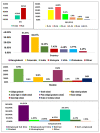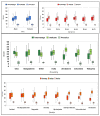COVID-19 Vaccine Hesitancy and Emerging Variants: Evidence from Six Countries
- PMID: 34821609
- PMCID: PMC8614952
- DOI: 10.3390/bs11110148
COVID-19 Vaccine Hesitancy and Emerging Variants: Evidence from Six Countries
Abstract
As the world tries to cope with the devastating effects of the COVID-19 pandemic and emerging variants of the virus, COVID-19 vaccination has become an even more critical tool toward normalcy. The effectiveness of the vaccination program and specifically vaccine uptake and coverage, however, is a function of an individual's knowledge and individual opinion about the disease and available vaccines. This study investigated the knowledge, attitudes, and resulting community practice(s) associated with the new COVID-19 variants and vaccines in Bangladesh, Colombia, India, Malaysia, Zimbabwe, and the USA. A cross-sectional web-based Knowledge, Attitudes, and Practices (KAP) survey was administered to respondents living in six different countries using a structured and multi-item questionnaire. Survey questions were translated into English, Spanish, and Malay to accommodate the local language in each country. Associations between KAP and a range of explanatory variables were assessed using univariate and multiple logistic regression. A total of 781 responses were included in the final analysis. The Knowledge score mean was 24 (out of 46), Attitude score 28.9 (out of 55), and Practice score 7.3 (out of 11). Almost 65% of the respondents reported being knowledgeable about COVID-19 variants and vaccination, 55% reported a positive attitude toward available COVID-19 vaccines, and 85% reported engaging in practices that supported COVID-19 vaccination. From the multiple logistic models, we found post-graduate education (AOR = 1.83, 95% CI: 1.23-2.74) and an age range 45-54 years (AOR = 5.81, 95% CI: 2.30-14.69) to be significantly associated with reported COVID-19 knowledge. In addition, positive Attitude scores were associated with respondents living in Zimbabwe (AOR = 4.49, 95% CI: 2.04-9.90) and positive Practice scores were found to be associated with people from India (AOR = 3.68, 95% CI: 1.15-11.74) and high school education (AOR = 2.16, 95% CI: 1.07-4.38). This study contributes to the identification of socio-demographic factors associated with poor knowledge, attitudes, and practices relating to COVID-19 variants and vaccines. It presents an opportunity for collaboration with diverse communities to address COVID-19 misinformation and common sources of vaccine hesitancy (i.e., knowledge, attitudes, and practices).
Keywords: COVID-19 vaccination; SARS-CoV-2 vaccine; immunization programs; pandemics.
Conflict of interest statement
The authors declare no conflict of interest.
Figures






References
-
- WHO Coronavirus Disease (COVID-19) Pandemic. [(accessed on 1 September 2021)]. Available online: https://www.who.int/emergencies/diseases/novel-coronavirus-2019.
-
- Aleem A., Akbar Samad A.B., Slenker A.K. Emerging Variants of SARS-CoV-2 and Novel Therapeutics against Coronavirus (COVID-19) StatPearls Publishing; Treasure Island, FL, USA: 2021. - PubMed
-
- Pennington M. Vaccine Hesitancy: A Story as Old as Vaccines Themselves. 2021. [(accessed on 14 October 2021)]. Available online: https://www.criver.com/eureka/vaccine-hesitancy-story-old-vaccines-thems....
LinkOut - more resources
Full Text Sources
Research Materials
Miscellaneous

